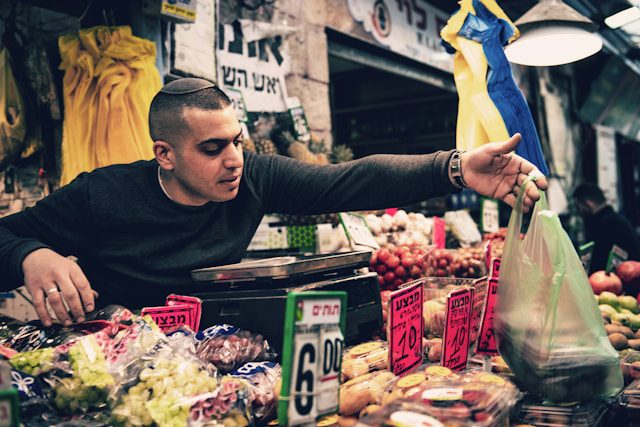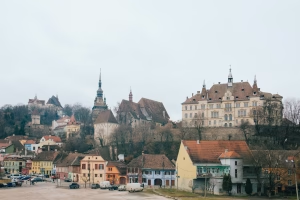Israel’s best markets are a kaleidoscope of colors, flavors, and traditions. In these bustling hubs, you can haggle for spices, savor street food, hunt for antiques, and soak up the country’s vibrant culture.
Whether you’re seeking fresh produce or handcrafted souvenirs, Israel’s markets offer a sensory feast. From Tel Aviv’s trendy night markets to Jerusalem’s ancient bazaars, join us on a journey through 12 of Israel’s most captivating marketplaces. In this comprehensive guide, we’ll discuss:
- 12 Best Markets in Israel
- 1. Carmel Market (Shuk HaCarmel) – Tel Aviv
- 2. Mahane Yehuda Market – Jerusalem
- 3. Jaffa Flea Market (Shuk Hapishpeshim) – Tel Aviv
- 4. Levinsky Market – Tel Aviv
- 5. Wadi Nisnas Market – Haifa
- 6. Sarona Market – Tel Aviv
- 7. Nahalat Binyamin Arts & Crafts Fair – Tel Aviv
- 8. Old City Market – Jerusalem
- 9. Akko Old City Market – Akko
- 10. Talpiot Market – Haifa
- 11. Ramla Market – Ramle
- 12. Bedouin Market – Beersheba
- Why Choose OneVasco?
- FAQs
12 Best Markets in Israel
1. Carmel Market (Shuk HaCarmel) – Tel Aviv

Tel Aviv’s largest and most famous market, Carmel Market (Shuk HaCarmel) is a foodie paradise. Weave through the colorful stalls piled high with fresh fruits, vegetables, spices, nuts, and baked goods. Don’t miss the market’s specialty – warm, flaky bourekas pastries filled with cheese, spinach, or potato.
-
Location: Carmel St., Tel Aviv
-
Hours: Sunday-Thursday (8 am-8 pm), Friday (8 am-5 pm)
-
What to Buy: Fresh produce, spices, bourekas, halva
-
Insider Tip: Come hungry and graze your way through the market’s many food stalls
2. Mahane Yehuda Market – Jerusalem
Jerusalem’s largest market, Mahane Yehuda (or “The Shuk”) is a labyrinth of alleys packed with vendors selling everything from fresh fish to artisan cheeses. The market really comes alive on Fridays as locals stock up for Shabbat. In the evenings, the market transforms into a lively bar scene.
-
Location: Jaffa St. and Agrippas St., Jerusalem
-
Hours: Sunday-Thursday (8 am-7 pm), Friday (8 am-3 pm)
-
What to Buy: Halva, za’atar spice mix, fresh-squeezed pomegranate juice
-
Fun Fact: Over 250 vendors work in the market
3. Jaffa Flea Market (Shuk Hapishpeshim) – Tel Aviv
Get lost in the winding alleys of one of Israel’s most famous flea markets. Jaffa’s Flea Market is a treasure trove of antiques, secondhand furniture, vintage clothes, and quirky knick-knacks. Spend an afternoon browsing the eclectic wares and practicing your haggling skills.
-
Location: Olei Zion St., Jaffa
-
Hours: Sunday-Thursday (10 am-6 pm), Friday (10 am-2 pm)
-
What to Buy: Antique tiles, vintage posters, unique jewelry
-
Pro Tip: Prices aren’t fixed, so always negotiate!
4. Levinsky Market – Tel Aviv
A local food market beloved by Tel Aviv chefs, Levinsky Market specializes in spices, dried fruits, nuts, and exotic pantry items. Browse the sacks of fragrant spices, sample some sweet Persian delicacies, and pick up unique ingredients to take your cooking to the next level.
-
Location: Levinsky St., Tel Aviv
-
Hours: Sunday-Thursday (8 am-6 pm), Friday (8 am-3 pm)
-
What to Buy: Saffron, dried Persian limes, date syrup
-
Insider Tip: Stop by Yom Tov Deli for their famous ikra (whitefish roe spread)
5. Wadi Nisnas Market – Haifa
Tucked in Haifa’s picturesque Wadi Nisnas neighborhood, this traditional market reflects the city’s diversity. Wind your way past stalls selling Arabian spices, freshly baked pita, Turkish coffee, and local olive oils. The market really shines during the holiday season, with special decorations and foods.
-
Location: Wadi Nisnas St., Haifa
-
Hours: Daily, mornings are busiest
-
What to Buy: Zaatar, olive oil soaps, traditional ceramics
-
Cultural Tip: Look for the neighborhood’s famous painted doors
6. Sarona Market – Tel Aviv
For a more upscale market experience, head to Tel Aviv’s Sarona Market. This sleek, indoor food market features artisan food stalls, boutique shops, and trendy eateries. It’s one of the best places in the city for people-watching over an alfresco lunch or glass of Israeli wine.
-
Location: Aluf Kalman Magen St., Tel Aviv
-
Hours: Sunday-Wednesday (9 am-9 pm), Thursday-Saturday (9 am-11 pm)
-
What to Buy: Gourmet cheeses, Israeli wines, handmade chocolates
-
Fun Fact: The market is housed in a former German Templar colony
7. Nahalat Binyamin Arts & Crafts Fair – Tel Aviv
Every Tuesday and Friday, the Nahalat Binyamin pedestrian street transforms into a vibrant open-air arts and crafts fair. Browse the stalls of over 200 Israeli artists, featuring everything from paintings to pottery to jewelry. Live music and street performers add to the market’s creative vibe.
-
Location: Nahalat Binyamin St., Tel Aviv
-
Hours: Tuesdays and Fridays (10 am-5 pm)
-
What to Buy: Handmade ceramics, local art, unique jewelry
-
Tip: Many vendors accept credit cards, but cash is helpful for small purchases
8. Old City Market – Jerusalem

Step back in time at Jerusalem’s Old City Market, a labyrinth of narrow stone alleys lined with stalls selling everything from exotic spices to handwoven rugs. Each of the Old City’s four quarters (Muslim, Jewish, Christian, Armenian) has its own distinctive market atmosphere.
-
Location: Old City, Jerusalem
-
Hours: Daily (approximately 9 am-5 pm)
-
What to Buy: Armenian ceramics, Arabic embroidery, Jewish ritual items
-
Cultural Tip: Dress modestly, as the market winds past holy sites
9. Akko Old City Market – Akko
The UNESCO heritage city of Akko (Acre) is home to a fascinating old market that feels straight out of 1001 Nights. Get lost in the stone alleyways lined with stalls selling spices, soap, pottery, and traditional Arab sweets. Don’t miss the market’s famous hummus restaurants.
-
Location: Old City, Akko
-
Hours: Daily, mornings to late afternoon
-
What to Buy: Olive oil soap, zaatar spice mix, Akko sesame sweets
-
History Tip: The market dates back to the Ottoman era
10. Talpiot Market – Haifa
Haifa’s bustling, workaday Talpiot Market is a great place to witness daily life. Vendors sell everything from cheap clothing to fresh produce to housewares. Check out the adjoining Turkish Market, packed with spice stalls and small eateries serving up authentic Turkish cuisine.
-
Location: Sirkin St. and HaAtzmaut Rd., Haifa
-
Hours: Sunday-Thursday (mornings to early evening)
-
What to Buy: Fresh fish, inexpensive clothes, Turkish coffee
-
Foodie Tip: Try the gozleme (stuffed Turkish flatbreads) sizzling on griddles
11. Ramla Market – Ramle

About halfway between Tel Aviv and Jerusalem, the central city of Ramle hosts a fascinating wholesale market in a Mandate-era hangar. Stroll past stalls piled with seasonal produce, buckets of olives, and sacks of spices in Ramla Market. The shuk is also famous for its authentic Middle Eastern eateries.
-
Location: Herzl St., Ramle
-
Hours: Sunday-Thursday (early morning to early afternoon)
-
What to Buy: Bulk spices, cheap produce, Ramle olive oil
-
Insider Tip: Try the market’s famous kaak, an oval-shaped bread covered in sesame seeds
12. Bedouin Market – Beersheba
For a unique market experience, head to the Negev Desert city of Beersheba, where Bedouin traders gather at this weekly outdoor market. Browse stalls selling everything from livestock to colorful fabrics to traditional Bedouin coffee pots. It’s a fascinating glimpse into Israel’s Bedouin culture.
-
Location: Hebron Rd. and Henrietta Szold St., Beersheba
-
Hours: Thursdays (early morning to early afternoon)
-
What to Buy: Bedouin jewelry, woven rugs, colorful scarves
-
Cultural Tip: Be respectful when taking photos, as some Bedouin women prefer not to be photographed
Why Choose OneVasco?
OneVasco makes visa applications effortless. Our expert team manages the entire process, allowing you to focus on your journey.
Enjoy stress-free travel with fast visa approvals.
-
Expert and Personalized Support
-
Efficient and Hassle-Free Process
-
Real-Time Tracking and Updates
-
Transparent Communication
-
Trusted by Millions
FAQs
1. What are the best things to buy from markets in Israel?
Some of the best things to buy at markets in Israel include:
-
Fresh produce like fruits, vegetables, and herbs
-
Spices such as za’atar, sumac, and ras el hanout
-
Nuts, seeds, and dried fruits
-
Traditional pastries and sweets like rugelach, knafeh, and baklava
-
Locally-made cheeses and olive oils
-
Judaica items and Israeli-made handicrafts
-
Embroidered textiles and woven rugs from Bedouin artisans
-
Antiques and vintage finds at flea markets in Israel like Jaffa
2. What is the best time to shop in Israel?
Most markets in Israel are open Sunday to Thursday or Friday. Hours are reduced or closed on Shabbat (Saturday). Food markets like Carmel and Mahane Yehuda are best in the morning. Friday mornings are busier as people shop for Shabbat. Flea markets like Shuk Hapishpeshim open all day, busiest in the afternoons.
3. Is it worth shopping in Israel?
Absolutely! Whether you’re searching for fresh ingredients to cook an Israeli meal, hunting for unique gifts and souvenirs, or just soaking up the vibrant atmosphere, Israel’s markets are an essential part of any trip.
4. What stores are cheaper in Israel?
In general, shopping at markets and independent stores in Israel will be cheaper than shopping at chain retailers or malls. Some of the best bargains can be found at:
-
Flea markets like Jaffa’s Shuk Hapishpeshim, where you can haggle for discounted antiques, second-hand goods, and vintage items
-
Produce markets like Carmel Market or Hatikva Market, which offer low prices on fresh fruits and vegetables
-
Wholesale markets like the Ramle Market, where you can find bulk spices, grains, and other pantry staples at reduced costs
-
Discount clothing stores along streets like Allenby or in neighborhoods like the Florentine in Tel Aviv
5. Is shopping in Israel expensive?
Shopping in Israel can vary by location and item. Luxury malls and upscale boutiques are expensive, especially for international brands. Local markets and independent shops offer reasonable prices on produce, spices, and unique items. Electronics, cars, and imported goods tend to be pricier due to high taxes.
6. How much gold can I carry from Israel to India?
According to Indian customs regulations, you can bring gold into India under the following limits without paying duty:
-
Up to Rs. 50,000 worth of gold jewelry for women
-
Up to Rs. 25,000 worth of gold jewelry for men
Anything over these amounts may be subject to customs duty. The rules differ if you’re a returning Indian resident after more than a year abroad.





















